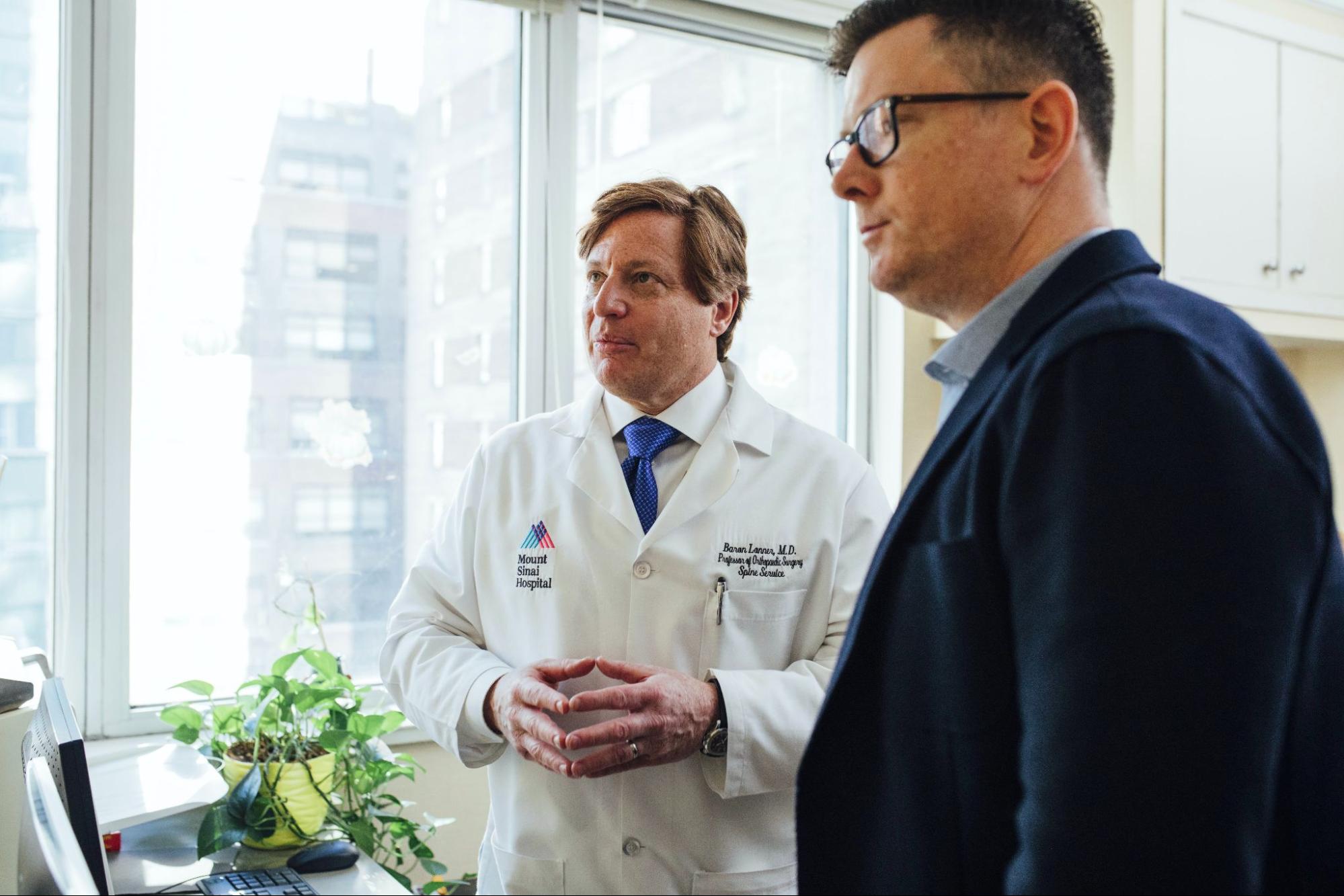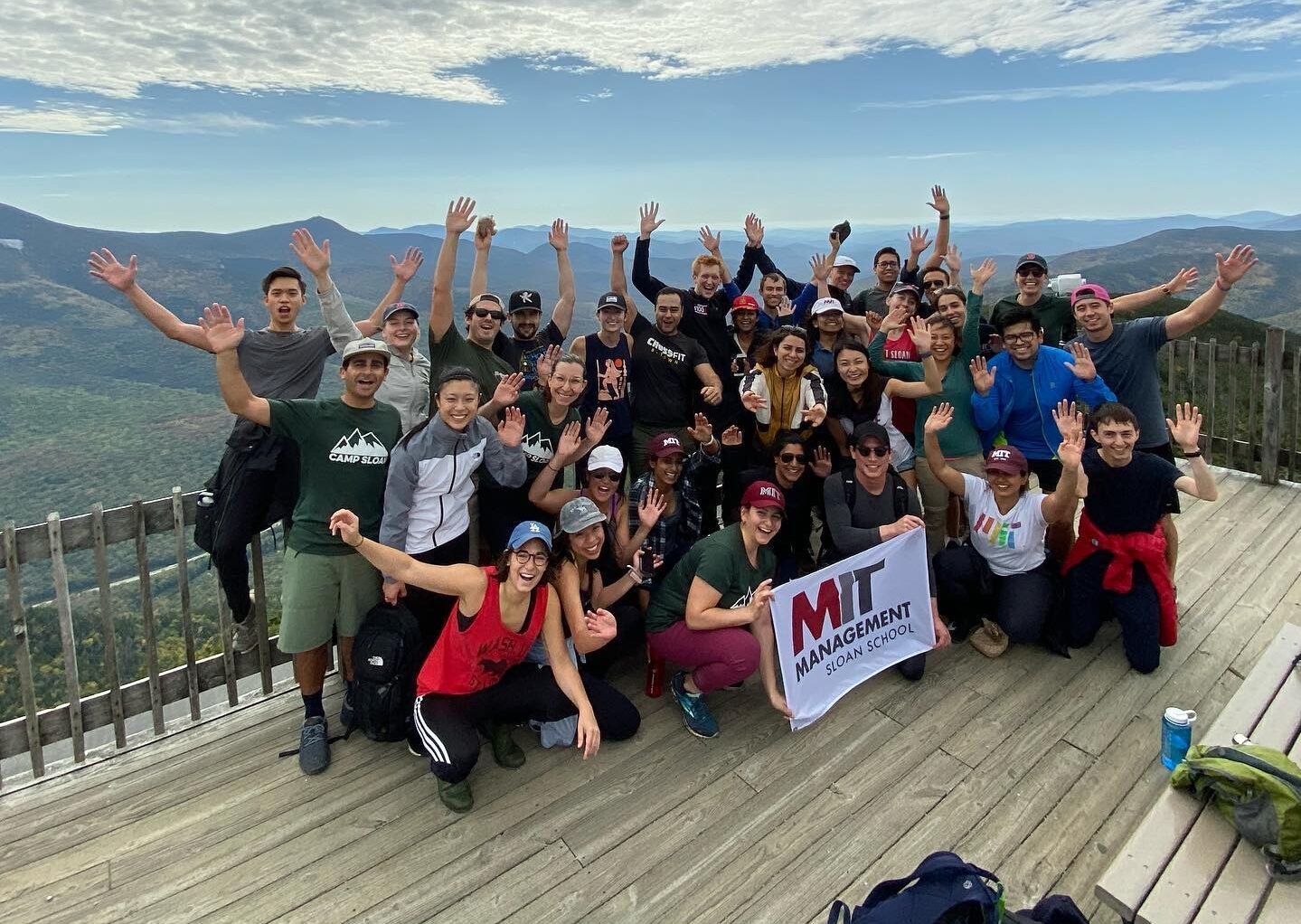UPDATE: This article was originally posted on May 5, 2021. It has been updated with new information and tips below.
Do you have experience in the medical field and want to build your management skills? Perhaps you have business experience but want to transition into the healthcare industry? Or maybe you are interested in making social impact through healthtech? In any case, an MBA in healthcare can help you boost your career and become a leader within medical organizations.
Healthcare is an important market; spending in this industry accounts for more than 17% of the US economy. And as affordable, accessible healthcare becomes increasingly essential, the need for qualified people to manage healthcare facilities is also rising.
A healthcare MBA will give you the specialized managerial skills and knowledge needed to lead within healthcare systems, medical centers and hospitals, and other health-related centers and organizations. If your passion lies in this field and you need either the business or medical knowledge needed to follow this path, pursuing a specialized MBA in healthcare may be right for you.
And what’s more, there are plenty of top programs that offer a wide range of options for this specialization. To help you decide which one is best for you, we’ve compiled a list of the most beneficial programs out there so you can compare and consider them against your own needs and interests.
What does an MBA in healthcare look like?
While healthcare MBA programs differ according to many factors such as specialization and values, all share a few key similarities.
First, within any healthcare MBA, you will learn about key business concepts, such as marketing, finance, and project management, so that you are fully prepared for management, even if you do not have a business background. Most usually take two years of full-time study to complete, although some, such as Kellogg, allow students to take three full-time semesters to complete in one year.

Once you have covered your business fundamentals, you will then start to take courses focused on management in healthcare settings; these programs are organized into different concentrations. However, generally, these courses examine essential topics like clinical management, healthcare information systems, and regulatory compliance.
Depending on the program you choose and the courses you take, you will have a variety of options ahead of you once you get back to your career post-MBA. Most graduates will pursue healthcare administration, as there are a plethora of high-profile, well-paying jobs in this area.
However, you could also consider positions in health services, healthcare consulting, or managing medical practice operations or pharmaceutical branding; or perhaps you are currently unsure of exactly what role you want to have in the industry, but know you are passionate about the intersection of health and business and want to explore your options as you pursue your MBA!
Top MBA programs for healthcare
Listed below are the best MBA programs for students interested in pursuing healthcare after graduation. We detail the program’s length, location, and an overview of healthcare opportunities available at the school.
The University of Pennsylvania – Wharton School of Business

Source: @whartonschool on Instagram
Location: Philadelphia, PN (United States)
% of students entering healthcare: 5%
Median post-MBA salary in healthcare: $163,000
Wharton’s Health Care Management (HCM) Program is one of the most established and respected healthcare-focused MBA tracks in the country. Unlike other MBA healthcare specializations, students must declare their intent to major in Health Care Management upon applying to Wharton, ensuring a highly focused and engaged cohort. The curriculum includes a Health Care Field Application Project, where students gain hands-on experience by consulting for healthcare organizations, as well as electives that cover a wide range of industry-relevant topics, from U.S. Payer and Provider Strategy to Health Care Reform.
Beyond the classroom, Wharton provides numerous opportunities for students to immerse themselves in the healthcare ecosystem. The Wharton Global Health Volunteers program allows students to engage in pro-bono consulting projects for healthcare organizations worldwide, offering firsthand experience in tackling global health challenges. The Health Care Club connects students with industry leaders through events, treks, and networking opportunities, while Wharton’s strong alumni network in healthcare ensures ongoing mentorship and career support.
With its rigorous curriculum, experiential learning, and deep industry ties, Wharton’s HCM program is an excellent choice for those looking to lead in healthcare management, investing, and innovation.
Duke University – Fuqua School of Business

Source: @dukefuqua on Instagram
Location: Durham, NC (United States)
% of students entering healthcare: 7%
Median post-MBA salary in healthcare: $137,000
Fuqua’s Health Sector Management (HSM) Certificate Program is designed for those seeking to understand the challenges and opportunities within healthcare, as well as those seeking a transition into health management. Fuqua’s healthcare program is offered across MBA programs, including the Daytime MBA, Global Executive MBA, and Weekend Executive MBA. Courses within the HSM program include a wide range of topics, such as “Biotechnology and Pharmaceutical Strategy,” “Marketing of Health and Wellness,” and “Health Care Markets.”
Students also have access to a number of extracurricular opportunities related to healthcare, including the Duke Health Sector Advisory Council, which meets biannually to discuss key issues in the industry, and the HSM Bootcamp, which exposes students to industry professionals and career opportunities.
With its comprehensive curriculum, diverse course offerings, and strong industry connections, Fuqua’s HSM program provides students with the knowledge, hands-on experience, and network needed to make a meaningful impact in healthcare. Whether students are looking to break into the industry or advance their careers in healthcare leadership, Fuqua’s robust program, combined with its collaborative culture and proximity to Duke’s world-renowned medical center, ensures they are well-equipped to navigate the evolving healthcare landscape.
Northwestern University – Kellogg

Source: @kelloggschool on Instagram
Location: Evanston, IL (United States)
% of students entering healthcare: 9%
Median post-MBA salary in healthcare: $140,000
The Healthcare at Kellogg (HCAK) pathway requires students to complete at least one foundational course before moving on to more specialized electives, such as “Medical Technologies in Global Public Health” and “Forging and Funding Health Care Startups.”
Students also have the opportunity to complete capstone projects and experiential learning courses like “NUVention Medical Innovation” and “Medical Technologies in Developing Countries.”
Additionally, Kellogg’s Healthcare Club offers resources and networking opportunities, such as events with healthcare and biotech professors and industry executives. Kellogg also hosts the annual Kellogg Business of Healthcare Conference (KBHC), which allows participants to discuss and debate a key, relevant topic in healthcare.
With its interdisciplinary approach, strong experiential learning opportunities, and access to industry leaders, Kellogg’s healthcare offerings prepare students to tackle complex challenges in the sector.
Columbia Business School
 Source: @columbia_biz on Instagram
Source: @columbia_biz on Instagram
Location: New York City, NY (United States)
% of students entering healthcare: 3.8%
Median post-MBA salary in healthcare: $140,000
Though finance might be what first comes to mind when potential applicants think of Columbia, the school packs a punch in healthcare as well. More than just a major, Columbia’s Healthcare and Pharmaceutical Management Program is set up to give healthcare-focused students everything they need to succeed through top-notch academics, extracurricular activities, and career support.
First, the program offers courses to suit a range of post-MBA paths, including “Investing in Digital Health Startups” and “Biotech/Pharma Commercialization and Development Strategies.” Outside of class, students can participate in events like the “Healthcare Leadership Series,” which connects small groups of students and alumni to discuss challenges in the industry.
Finally, the Healthcare Mentorship Program provides unparalleled support during the recruitment process. With its strategic location in New York City, strong industry ties, and well-rounded curriculum, Columbia’s Healthcare and Pharmaceutical Management Program offers students the perfect environment to launch or accelerate their careers in healthcare.
The University of Michigan – Ross School of Business
 Source: @michiganross on Instagram
Source: @michiganross on Instagram
Location: Ann Arbor, MI (United States)
% of students entering healthcare: 9.2%
Median post-MBA salary in healthcare: $ $137,250
The Michigan Ross School of Business offers a comprehensive MBA program with a Healthcare Management Concentration, designed to equip students with the multidisciplinary skills required for leadership roles in the healthcare industry. This concentration allows students to tailor their education by selecting from a diverse range of electives acrossthe various University of Michigan schools, including the School of Public Health and the School of Information.
The curriculum encompasses courses such as “Healthcare Markets and Public Policies” and “Healthcare Startups: Understanding Needs and Creating Ventures in Healthcare,” providing a robust foundation in healthcare management. Beyond the classroom, Ross emphasizes experiential learning through initiatives like the Multidisciplinary Action Projects (MAP), where students collaborate on real-world consulting projects with healthcare organizations, applying their knowledge to address current industry challenges.
Students can further engage with the healthcare sector by participating in the Healthcare and Life Science Club (HLS), which offers networking opportunities, educational sessions, and events such as the annual HLS Symposium. This two-day event brings together students and industry professionals to discuss pressing healthcare topics and explore career opportunities.
Through its interdisciplinary curriculum, action-based learning approach, and strong industry connections, Michigan Ross prepares students to become innovative leaders capable of navigating and transforming the evolving healthcare landscape.
MIT – Sloan School of Management
 Source: @sloanstudentlife on Instagram
Source: @sloanstudentlife on Instagram
Location: Cambridge, MA (United States)
% of students entering healthcare: 6.8%
Median post-MBA salary in healthcare: $150,000
For those aiming to lead and innovate in the healthcare sector, the MIT Sloan School of Management offers a robust MBA program with specialized pathways to integrate healthcare expertise into business leadership. Central to this is the Healthcare Certificate, available to all MIT degree students, which provides foundational knowledge and hands-on industry experience. The curriculum includes required courses like the Healthcare Lab (H-Lab), an action learning course where students collaborate with healthcare organizations to tackle real-world challenges, and a selection of electives that allow students to tailor their learning to specific interests within the healthcare field.
Beyond the classroom, students can engage with the MIT Sloan Health Systems Initiative (HSI), which focuses on discovering transformative and sustainable innovations to improve health by connecting world-class researchers with healthcare leaders. This initiative offers opportunities for students to participate in cutting-edge research and projects aimed at enhancing healthcare delivery and operations.
Through its interdisciplinary curriculum, experiential learning opportunities, and strong connections to the healthcare industry, MIT Sloan equips students with the skills and networks necessary to drive innovation and leadership in the evolving healthcare landscape.
XThe University of North Carolina – Kenan-Flagler Business School
 Source: @unckenanflagler on Instagram
Source: @unckenanflagler on Instagram
Location: Chapel Hill, NC (United States)
% of students entering healthcare: 11%
Median post-MBA salary in healthcare: $130,000
For those seeking to lead in the healthcare industry, the UNC Kenan-Flagler Business School offers a robust MBA program with a dedicated Healthcare Concentration. This concentration provides students with a comprehensive understanding of the healthcare sector, integrating business principles with healthcare-specific knowledge. The curriculum includes courses such as “Design and Delivery of Healthcare Systems” and “Global Healthcare,” ensuring students are well-prepared to tackle the complexities of the industry.
Beyond the classroom, students can engage with the MBA Healthcare Club, a student-run organization that prepares future leaders for careers at the intersection of business and health. The club offers resources, industry knowledge, and a community-focused approach, organizing events like the annual Healthcare Conference, which brings together academics, students, alumni, and industry leaders to discuss pressing healthcare issues.
Additionally, the Center for the Business of Health at UNC leverages the university’s top-ranked schools of pharmacy, public health, nursing, dentistry, and medicine to address key challenges in today’s healthcare industry. This interdisciplinary approach provides MBA students with unique opportunities to collaborate across disciplines, enhancing their educational experience and preparing them for leadership roles in healthcare.
Through its comprehensive curriculum, experiential learning opportunities, and strong industry connections, UNC Kenan-Flagler equips students with the skills and networks necessary to drive innovation and leadership in the evolving healthcare landscape.
Vanderbilt Owen
 Source: @vanderbiltowen on Instagram
Source: @vanderbiltowen on Instagram
Location: Nashville, TN (United States)
% of students entering healthcare: 14%
Median post-MBA salary in healthcare: $140,000
Vanderbilt Owen Graduate School of Management is a great choice for those looking to break into healthcare leadership, thanks to its strong ties to Nashville—often called the “Healthcare Capital of the U.S.” Home to over 500 healthcare companies, including HCA Healthcare, Change Healthcare, and Vanderbilt University Medical Center, Nashville provides a wealth of networking and job opportunities for Owen students.
Owen’s Center for Healthcare Market Innovation connects students with industry leaders and emerging trends, while the Healthcare concentration features courses in healthcare analytics, strategy, and operations, equipping students with the skills needed to drive innovation in the sector. Vanderbilt Owen also offers a joint MBA/MD degree, the first three years of which are spent in medical school and the final two of which are spent in business school.
Berkeley Haas
 Source: @berkeleyhaas on Instagram
Source: @berkeleyhaas on Instagram
Location: Berkeley, CA (United States)
% of students entering healthcare: 8%
Mean post-MBA salary in healthcare: $143,500
For those aiming to lead in healthcare, the Berkeley Haas School of Business offers a comprehensive MBA program that integrates business acumen with healthcare expertise. Students can pursue a Health Management Emphasis, which includes courses like Healthcare in the 21st Century and Health Care Finance. Additionally, the MBA/MPH Concurrent Degree Program allows students to earn both an MBA and a Master of Public Health in 2.5 years, preparing them for diverse roles in healthcare sectors.
The Haas Healthcare Association is a student-run organization that connects UC Berkeley students passionate about transforming the healthcare ecosystem. HHA organizes events, workshops, and networking opportunities, fostering collaboration among students from various disciplines.
Berkeley Haas’s strategic location near leading healthcare firms like Genentech and Kaiser Permanente provides students with ample opportunities for internships, projects, and employment in the healthcare industry.
Through these programs and resources, Berkeley Haas equips students with the skills and networks necessary to drive innovation and leadership in the healthcare sector.
Dartmouth Tuck
 Source: @tuckschool on Instagram
Source: @tuckschool on Instagram
Location: Hanover, NH (United States)
% of students entering healthcare: 8%
Median post-MBA salary in healthcare: $135,000
For those seeking leadership roles in healthcare, the Tuck School of Business at Dartmouth offers a comprehensive MBA program with specialized opportunities in the health sector. Through the Center for Health Care, students can engage in elective courses, experiential learning, and networking events tailored to the healthcare industry.
Tuck also provides joint degree options, such as the MBA/MPH in collaboration with The Dartmouth Institute for Health Policy and Clinical Practice, and the MD/MBA with the Geisel School of Medicine, equipping students with interdisciplinary expertise to tackle complex healthcare challenges.
Additionally, the student-led Health Care Club offers a platform to explore career opportunities, organize treks to healthcare companies, and collaborate with the Career Development Office, fostering a community of future healthcare leaders.
Through these programs and resources, Tuck equips students with the skills and networks necessary to drive innovation and leadership in the healthcare sector.
Additional Programs to Consider
Though they didn’t make our Top 10 list, there are numerous other excellent MBA programs for healthcare-focused MBA professionals. In addition to the schools mentioned above, you may want to also take a closer look at Harvard Business School, Stanford GSB, The University of Texas McCombs, Yale SOM, The University of Chicago Booth, and UCLA Anderson. If Europe is more your style, St. Gallens and SDA Bocconi are excellent options as well. If you’re looking in Asia, CEIBS is a great choice.
Learn more about finding the right healthcare program for you
As healthcare becomes a more common focus within MBA programs, it can be overwhelming to know which schools are the best fit for you and whether this is even the right choice for your future.
Luckily, Ellin Lolis Consulting has an outstanding team with the knowledge and advice you need to make these decisions. And what’s more, we can even help you get admitted to the program of your dreams with our expertise in successful MBA applications.
Whether you are considering a future in healthcare or need advice on how to appeal to the admissions committee at your program of choice, we here at Ellin Lolis Consulting are excited to help add more value to your application than you ever thought possible – all while retaining your unique voice.
Over 98.9% of our clients get accepted to at least one of their preferred programs, and we’d love to help you, too. Apply to work with us and get accepted into your top choice healthcare MBA!
Real MBA Essays That Got People In
School-specific sample essays that got our clients accepted






